How to Hide Apps on Android (Samsung, Xiaomi, OPPO, Pixel & More)
Want to keep certain apps private on your Android phone? Whether it's to reduce distractions, protect sensitive information, or simply declutter your home screen, Android offers several ways to hide apps. The methods vary depending on your device brand (Samsung, Xiaomi, OnePlus, Pixel, etc.) and Android version (up to Android 14).
Below, we'll cover the latest and easiest methods to hide apps on Android, along with tips for parents who want to uncover hidden apps on their child's phone.

- Part 1: 6 Best Ways to Hide Apps on Android
- Part 2: How to Find Hidden Apps on Android?

- Part 3: Useful Tips to Protect Your Online Privacy
Part 1: 6 Best Ways to Hide Apps on Android
In this part, we will provide step-by-step instructions on how to hide apps using built-in settings and the third-party launchers.
1. Built-in Settings (on different brands)
Most Android devices can hide apps from the home screen settings. These settings are available directly on the phone and don't require third-party applications. Below we introduce several operating methods for common Android brands.
On Samsung
Open your Samsung device settings.
Scroll down and click on the Home screen.
Search and click Hide apps.
Now click as many apps as you wish to hide, and the hidden applications won't appear in the home screen menu.
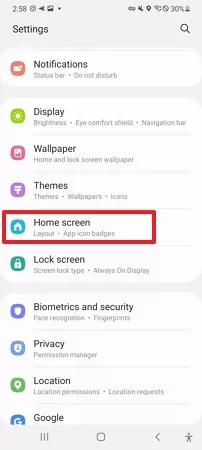
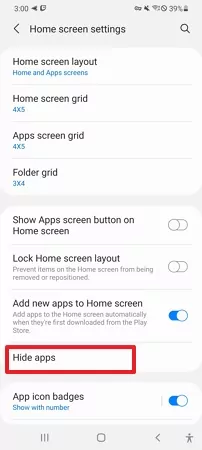
On OPPO (ColorOS 14)
- 1. Go to Settings > Privacy > Hide Apps.
- 2. Set a privacy password and select apps to hide.
Apps can be accessed by entering a password in the dialer
On Vivo (Funtouch OS 14)
- 1. Go to Settings > Privacy > Hide Apps.
- 2. Choose apps and set an access password.
Hidden apps are accessed via a search bar or password entry.
On LG
Head over to Settings.
Click on the "Display tab" and select "Home screen."
There is an option named "Hide apps."
Select the applications you wish to hide and then click Done.
On Xiaomi / Redmi (HyperOS / MIUI)
- 1. Go to Settings > Apps > App Lock > Hidden Apps.
- 2. Select apps to hide, and they’ll disappear from the home screen.
On Realme (Realme UI 5.0)
- 1. Go to Settings > Privacy > App Lock > Hide Apps.
- 2. Enable hiding and set a password.
Hidden apps are accessible via a password in the dialer (similar to OPPO).
On Pixel (Android 14 / Private Space)
- 1. Go to Settings > Security & Privacy > Private Space.
- 2. Add apps you want to move into a secure private folder.
On OnePlus
Launch the app drawer.
Use the swipe gesture to open the Hidden Space.
Hit the + menu on the top-right side.
Choose the apps you wish to hide.
On Motorola
Turn on the Motorola screen and unlock the device.
From the home screen, tap and hold an application you wish to hide or remove.
Drag the application on the Remove section at the top of the interface to hide the application from the home screen.
Pro Tip: Each brand has slightly different access methods. For OPPO/Realme, hidden apps often need to be unlocked using a secret code in the dialer.
2. Android Launcher Apps
Another efficient way to hide apps is to use a launcher app. Launcher apps allow you to customize the look and feel of your home screen, and many of them come with the option to hide apps. You can hide any secret application you don't want anyone to know about with one of these launcher applications.
(1) Nova Launcher
Among the best features of Nova Launcher's premium version is the ability to hide applications that are not visible to others. The third-party tool prevents specific apps from showing in the app drawer. A lot of users find it worthwhile when it comes to compelling customizations, managing apps, and even setting labels for specific apps.

Install and launch the Nova Launcher prime. Make sure it's your default launcher.
Open the Nova Launcher Prime settings section to activate added functions and search for the option named "Applications."
You can hide applications by clicking the Hide applications option under the category Drawer groups.
(2) App Hider
App Hider is a highly useful application designed to help users hide other applications on their smartphones. It provides an extra layer of security and privacy, ensuring that your personal and sensitive information is kept safe from prying eyes. Check out these steps for hiding secret apps in App Hider.

Download and open App Hider.
Tap the + icon to select the app you want to hide and then tap "Import."
After the import process is complete, the app will appear in the App Hider interface.
3. Secure Folder
A secure folder is a built-in security feature that lets you hide apps, files, and other sensitive content on Android. Samsung devices are equipped with a private and encrypted secure folder that can only be accessed with a PIN or password. Best of all, it's totally free to use. So if you've got some apps you desire to keep hidden, read on for a step-by-step guide on how to use Secure Folder.
(1) Create a New Secure Folder
You need a Samsung account to create a secure folder.
Open Samsung device settings and head over to "Biometrics and security."
Check the Secure Folder menu.
Sign in to your Samsung account.
There are a few permissions that you can allow to "secure folder" and choose the security method(PIN or Password).
You can see a shortcut to the secure folder that appears on your home screen.
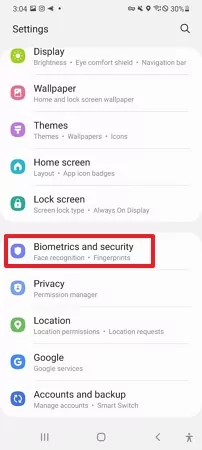
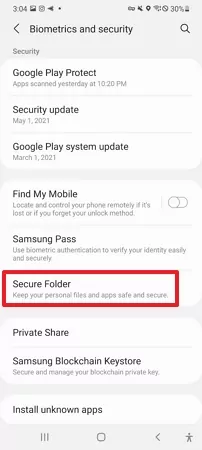
(2) Add Apps to a Secure Folder
Launch the Secure Folder.
Hit the "Add Apps" menu on the top side of the screen.
Choose as many apps as you want and tap done once selected.
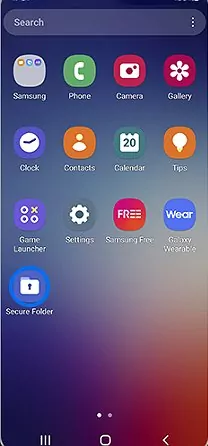
4. Rename Apps
This is a simple method that can be employed to reduce the prominence of an app by altering its name.
Navigate to the App Drawer and locate the app you wish to conceal.
Long-press the app's icon until a contextual menu pops up.
Choose either the "Edit" or "Rename" option from the menu.
Input the new name for the app in the provided text field.
Finalize the name change by tapping on "OK" or "Done."
It's crucial to note that this technique only offers a rudimentary form of application concealment. Others may still identify the app by its icon. If your default Android version doesn't support app renaming, consider downloading a third-party launcher or an app icon changer.
5. Disable Apps
You can hide apps on your device by disabling them. However, this method primarily works for pre-installed apps. Here's how you can do it:
1. Disable Apps on the Home Screen
Find the application you wish to disable.
Press and hold the application.
Tap on Disable.
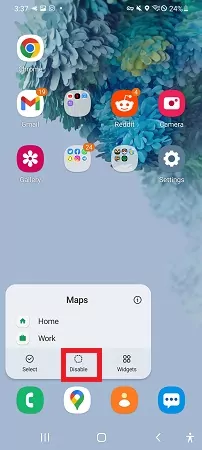
2. Disable Apps in the Settings
Open your device settings.
Head over to the App section. You can see a list of all apps installed.
Choose the application you wish to disable, and from the next window, click on Disable.
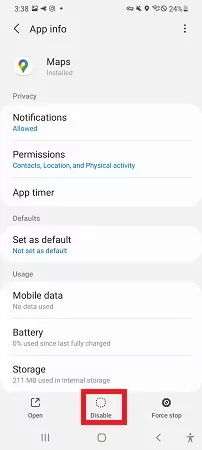
Please note that disabling an app will prevent it from running and remove it from your app list. Also, remember that disabling built-in apps may cause related apps to malfunction.
6. Create Guest Account or Secret Mode
This method will help you hide apps and be accessible when needed.
(1) Create Guest Account
You should create a guest account on your Android phone for many different reasons. Maybe you're loaning your phone to a friend, and you don't want them to see all of your apps. Guest account Allows you to hide apps from your main account and keep them private.
Navigate to device Settings.
Select System and click Multiple users > Guest.
You can quickly set up a profile by tapping Add new user.
By extending the notifications menu and selecting the human head icon (look for it by the date), you can switch over to guest mode.
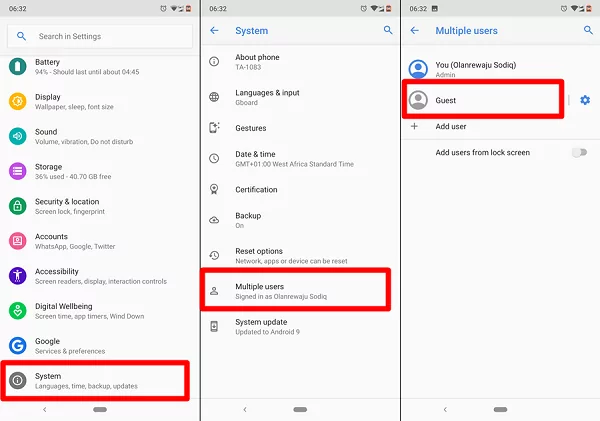
(2) Use Secret Mode
Samsung devices offer Secret mode configurations as an added security to keep secret files and apps.
Head to the settings and check if you have configured the Secret mode. Also, set a strong password.
Swipe down the notification panel.
Click on the Secret mode and enter the password to add the applications.
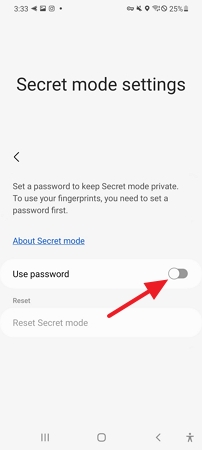
Part 2: How to Find Hidden Apps on Android
If you suspect apps are hidden:
- Step 1. Open Settings > Apps to see the full list.
- Step 2. Check for Secure Folder or Private Space.
- Step 3. Review installed launchers that may hide apps.
Bonus Tip for Parents
Instead of manually checking, you can use AirDroid Parental Control. It lets you:
- View a complete list of installed apps.
- Detect hidden or renamed apps.
- Get real-time alerts if new apps are installed.
This is especially useful if you want to make sure your child isn't hiding social media or unsafe apps.
Here's a quick guide to getting started with AirDroid Parental Control.
Step 1. Navigate to the Google Play Store or App Store and download the AirDroid Parental Control app. On your child's device, install the AirDroid Kids app and complete the setup process.
Step 2. Now, launch AirDroid Parental Control and select 'App List' to view all the hidden applications on your child's phone.
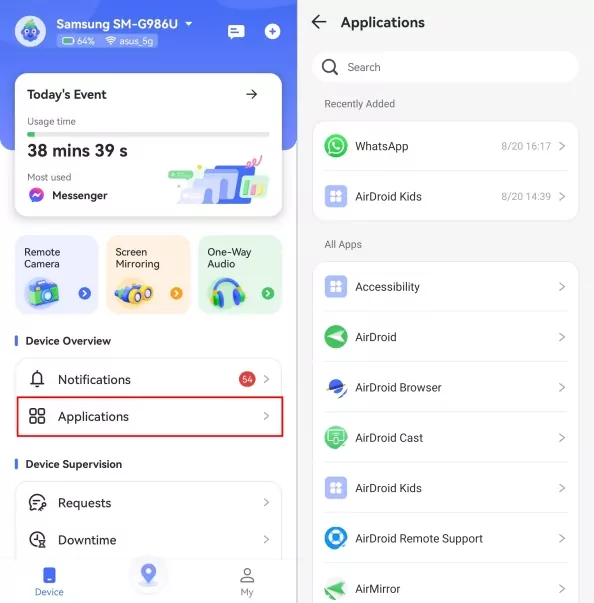
Part 4: Useful Tips to Protect Your Online Privacy
In the internet age, being aware of your online privacy is more important than ever. With data breaches and hacking becoming more common, you must protect yourself. While there's no single silver bullet regarding online privacy, you can do a few things to make it harder for hackers and spammers to get their hands on your personal information.
Set Strong Passwords
When it comes to online privacy, one of the most important things you can do is set strong passwords for all your accounts. A strong password should be at least eight characters long and contain a mix of upper and lowercase letters, numbers, and symbols. Avoid using easily guessed words like "password" or easily accessible personal information like your birthdate.
Disable App Tracking
App tracking refers to the practice of collecting data about a user's online activity in order to deliver targeted ads. This data includes information about which apps are used, how often they're used, and what content is viewed within the app. However, many users are concerned about their privacy regarding app tracking. These users do not want advertisers to have access to their data.
Use a Secure Search Engine
Secure search engines are a vital tool for protecting your online privacy. Encrypting your searches helps to prevent your data from being exposed to third parties. You need to choose a secure search engine that fits your needs from various available options( DuckDuckGo, SearchEncrypt, and Mojeek).
Final Note (Updated for 2025)
The methods above are tested on the latest Android versions, including Android 13/14 and major custom skins like One UI 6.1, HyperOS, ColorOS, Funtouch OS, and OxygenOS.
Always choose the method that best fits your needs—whether you simply want a cleaner home screen, need extra privacy, or want to ensure your child isn’t hiding unsafe apps. For parents, tools like AirDroid Parental Control provide an extra layer of reassurance by uncovering hidden apps, sending instant alerts, and helping you stay informed in real time.
FAQs about Hiding Apps on Android



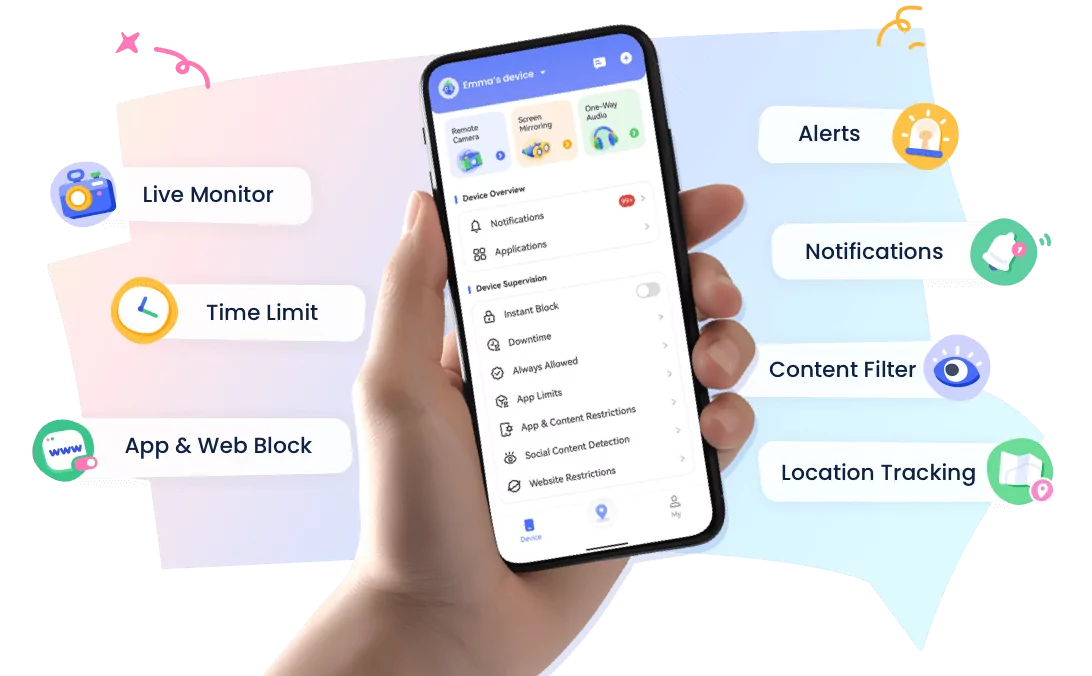










Leave a Reply.